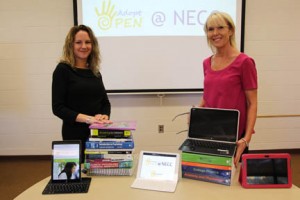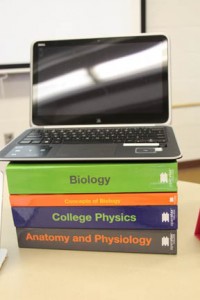NECC Embraces Open Educational Resources

Text Book Task Force co-chairs Jody Carson (left) and Sue Tashjian show some of the sources available through Open Educational Resources (right) as well as books that can be replaced.
When Northern Essex Community College Professor Mike Cross announced to his Introduction to Organic & Biochemistry students that they wouldn’t need to purchase textbooks, the class erupted in cheers.
While reactions in chemistry are expected, this was a bit unusual.
Cross’s students learned that instead of heavy, cumbersome, costly textbooks, they would be using free Open Educational Resources or OER through nonprofit organizations like Openstax and Creative Common as well as others.
Cross was one of the first Northern Essex professors to create an OER-based course and one of 21 NECC professors and instructors teaching 30 sections this fall exclusively using OER in their classes, according to Sue Tashjian and Jody Carson, who co-chair NECC’s Textbook Task Force. (This number is actually higher, but this number reflects the number of faculty who received stipends through the Textbook Task Force’s OER Initiative).
“I’m a huge fan of OER,” said Cross. “I currently teach two courses that use only OER resources: Physiological Chemistry and Introduction to Organic & Biochemistry.”
Cross says there is extra work involved in creating an OER course, but the benefits are great.
“I’ve found that there are some amazing free resources available for faculty and students. Many OER textbooks come from well-known sources, such as the OpenStax series of books from Rice University,” he said. “It takes some time and effort to sort through the various books to find one that fits your teaching style and the needs of the students, but it’s definitely worth the effort. This is especially true in the sciences where textbooks routinely cost $200-$300.”
What is OER?
By definition OER is “teaching, learning, and research resources that reside in the public domain or have been released under an intellectual property license that permits their free use or repurposing by others,” according to the U.S. Department of Education.
This means educators and students can freely and legally access, reuse, and adapt educational resources – most electronically. They can customize, and remix high-quality course materials creating an interactive experience; an experience not available for a student using a traditional textbook. For example, depending upon the class, OER may include news articles, embedded videos, learning objects, tests and test banks, and yes even full textbooks – all for free.
What it Means for NECC Students
The big news is that Cross’s chemistry students are not alone. NECC faculty, who have embraced OER since last fall, created over a $300,000 cost savings to Northern Essex students with a projected cost saving of $1 million over the next few years, said Tashjian.
Maria Carles created a “book” filled with OER articles she compiled and now uses in her Human Nutrition and Health class.
“I would like to offer an affordable option for students,” she said. “If they don’t have to spend a fortune on books perhaps they can afford to take an extra course and finish their course load earlier.”
Using OER in the classroom is a concept that has been gaining momentum nationally if not worldwide, said Carson. In fact, the White House has embraced OER initiatives and joined with educators, students, and technologists worldwide to recognize and celebrate Open Education Week, which is March 7 through 11 in 2016.
Chapter One
Northern Essex was an early adopter of OER. A humble textbook task force conceived by Bill Heineman, NECC’s vice president of academic and student affairs, back in the fall of 2012. Through a number of student forums Heineman heard complaints regarding the cost of textbooks, the lack of use after purchase, and the difficulty with access codes for expensive software. He convened a textbook task force pulling members from different areas of the college including staff from CIT, financial aid, learning accommodations, and advising; administrative support; faculty; students; and administrators. Books on Reserve at the NECC Library and the Financial Aid Lending Library were other initiatives that came out of the Task Force.
Carson, an early childhood education professor and an instructional coach in the Center for Instructional Technology and Tashjian, an adjunct faculty in CIS and Coordinator of Instructional Technology, took on the role of co-chairs, and developed a proposal outlining the benefits of using OER and the projected cost savings to students. Within 24 hours of their proposal, they received the initial funding of $5,000 from academic affairs.
All faculty were invited to apply for a $1,000 stipend to eliminate their costly textbook using only open educational resources instead. Carson and Tashjian, with the help of NECC library staff, were charged with educating the educators as to where to find and how to use different open educational resources.
Since then, they have worked tirelessly to secure funding from academic affairs, the NECC Fund, and the federal Trade Adjustment Assistance Community College and Career Training Grant.
Faculty who use open education resources to design a course, agree to share the resources they’ve developed with other OER users. So, faculty can access OER courses already designed and repurpose them for their own use perhaps adding a timely video or a relevant news story or they can create their own custom course.
NECC is on the OER frontlines and was the first Massachusetts community college to join the Community College Consortium for Open Education Resources, said Carson. She and Tashjian routinely field inquiries from other schools interested in launching open education programs at their schools. In fact, they were selected, to present at the OpenEd 15 Conference in Vancouver in November.
Book Store’s Involvement
The NECC Bookstore, operated by Follett, is identifying opportunities to drive student affordability and access to needed course materials in support of classroom success, according to NECC Bookstore manager Ray Short.
The bookstore offers the largest selection of used books in the industry and a huge rental library, he said. Follett will roll out a “price match program” in January which will give customers a bookstore gift card for the difference between the price paid at the NECC Bookstore and the lower advertised price from select online sources. This ensures students get their materials at the lowest cost possible and allows them to apply gift card dollars to supplies or other needed materials, said Short.
The Story Continues
Northern Essex’s use of open education continues to evolve, said Tashjian. For example, half of the 2016 winter intersession courses will be using OER.
Students who receive financial aid can still benefit from the free OER, Carson said. Book vouchers can be used at the college bookstore to purchase a digital device like an e-reader or laptop to access the free OERs or she noted, this frees up funds to allow them to apply toward taking an additional class.
NECC students continue to be part of the process, they said. The Northern Essex Student Senate just this month held textbook rallies on both campuses with the goal of promoting continued discussion on the use of traditional textbooks verses free open resources.
“We want the conversation to continue not end,” said Tashjian.








